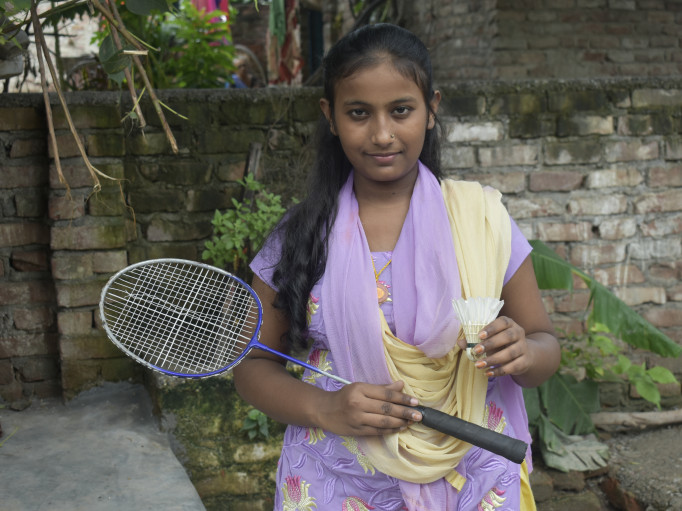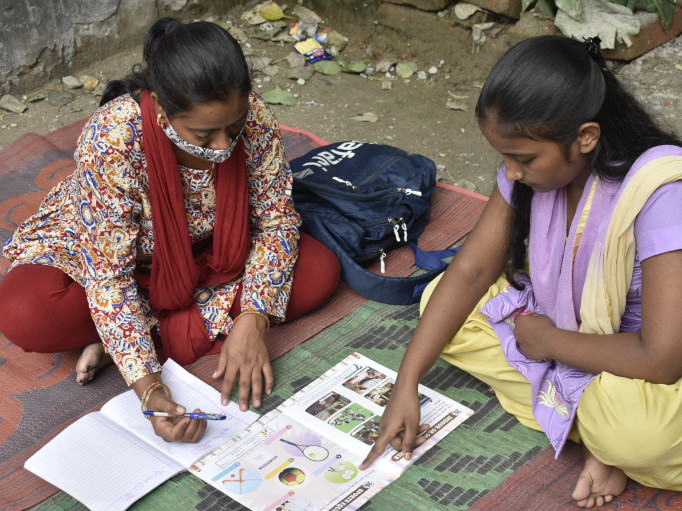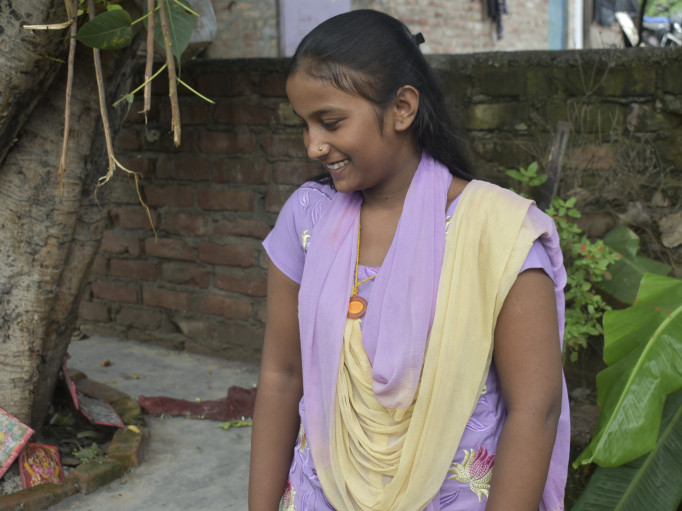“I am glad I no longer have to use the old clothes, which caused a lot of infection and irritation, as I have got access to sanitary napkins. I feel ecstatic when I see all my friends and other girls receiving sanitary pads.” Aditi

As a bright and intelligent girl of just 16, Aditi should be coming to the end of her education and looking forward to a future full of hope and opportunity. However, when tragedy hit her family, Aditi had to leave school behind and start work. On top of this, when her period came each month, she faced even greater isolation.
Street life in Delhi
Aditi lives in the slums of West Delhi with her parents and three siblings. For most of her life, her father and mother were able to provide for the family. Each day, her father would go to work as a security guard for a local house and her mother earned money by running her own tea stall. Two years ago however, Aditi’s mother was involved in an accident in which she lost one of her legs. As a result, she was confined to the family home and no longer able to work. With one less salary to support the family, it fell to Aditi and her older brother to find work, just so they could survive, meaning she had to leave school. She soon found work as a housemaid for a few families, while her brother started working as a labourer. "Leaving studies to start working to sustain my family was a grim decision for me. I am passionate about studying but responsibilities took over and I had to invest myself in earning money instead," she shares.
Creating education opportunities for street children
One day, Aditi and her mother met with Toybox’s partner, CHETNA, as they were conducting a survey for a project that teaches children life skills through sport. It was clear Aditi was passionate about studying and with the support of the team, she was able to enrol in Open Basic Education and complete her exams. She is now preparing for Class 10.

The importance of friendship on the streets
When she started at the project, it was clear Aditi was incredibly intelligent, but she was also very shy; it took her a while to open up and interact with others at the project. Over time though, she grew in confidence, became a lot more independent and even started forming friendships with some of the other girls in the group. "Before, I was a timid and shy person, I was scared of interacting with other people in my community. Since I became a part of the project, I’ve developed self-confidence through sports and games. Now I do not fear communicating with anyone. I can easily go anywhere alone. I have developed leadership qualities as well,” says Aditi. In the future, she now dreams of becoming a police officer to serve her country for the better.
Like everyone around the world, Aditi’s family’s life was changed when the pandemic started to take hold in India. As the nation faced complete lockdown, Aditi’s father could no longer work and her brother was out of work too. The family struggled to get by, borrowing money from relatives and chipping into their small amount of savings just to survive.
Period poverty for street children
As for many girls and young women, the pandemic made the times of the month when Aditi was on her period even more difficult. When the family could barely scrounge together enough money for food, money for sanitary products was available even less than normal – in these times, old clothes were the only option for Aditi. For most of her life, as long as Aditi was bleeding, her mother didn’t let her go outside and she wasn’t allowed to touch any edible items. She was also not allowed to bathe or wash her hair – in line with myths and traditions that were commonly believed by many women around Aditi.
Period poverty and stigma
Through her attendance at CHETNA’s project however, she learned more about these myths surrounding menstruation, working hard to change her own mind - and her mother’s. Eventually, Aditi began washing her hair during her period and her mother soon followed suit. Now she has received sanitary towels and gained knowledge of how to use them as well as how to maintain her personal hygiene during her period. "I am glad I no longer have to use the old clothes, which caused a lot of infection and irritation, as I have got access to sanitary napkins. I feel ecstatic when I see all my friends and other girls receiving sanitary pads from CHETNA. Everyone needs to know that using dirty clothes during menstruation can lead to disease and that it is very important to take special care of cleanliness at such times. I wish for people in my community to not treat girls like untouchables during their periods and to give them respect.”
Period poverty and street life
Having access to sanitary products has made life a lot easier for Aditi when she’s on her period. Now, she can freely roam, study, play and live like every other day.
You can give the gift of a period pack for just £3 today. Toybox frontline workers not only distribute sanitary products to girls living a life on the street, but offer that important education, encouragement and myth busting around the subject of menstruation, which for many, generations has been a subject that we just don't talk about.
Support a street child today, to receive the products she needs to remain clean and healthy during that time of the month.
